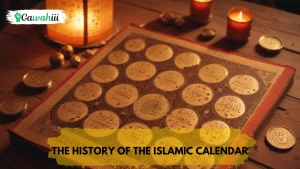Introduction: Why the Islamic Date Matters in Pakistan
Ever wondered what today’s Islamic date in Pakistan is and why it holds such significance? The Islamic, or Hijri, calendar guides millions of Muslims in Pakistan for religious observances, cultural events, and even daily life. As of July 5, 2025, the Islamic date in Pakistan is 10 Muharram 1447, a date rooted in the lunar-based Hijri calendar. Let’s dive into what makes this calendar unique, why it’s so important, and how it shapes life in Pakistan.
In this blog post, we’ll explore the Hijri calendar, its significance, how today’s Islamic date is determined, and much more. Whether you’re a curious reader or someone seeking clarity on Islamic dates, this guide is for you!
What Is the Islamic (Hijri) Calendar?
The Islamic calendar, also known as the Hijri calendar, is a lunar-based system used by Muslims worldwide. Unlike the Gregorian calendar, which follows the solar cycle, the Hijri calendar relies on the moon’s phases. This makes it about 10–12 days shorter than the Gregorian year, with 354 or 355 days.
The calendar begins with the Hijra, the migration of Prophet Muhammad (PBUH) from Mecca to Medina in 622 CE. Today’s Islamic date in Pakistan, 10 Muharram 1447, reflects this lunar system, which shapes religious and cultural practices across the country.
Why Is Today’s Islamic Date in Pakistan Important?
The Islamic date holds deep meaning for Pakistan’s predominantly Muslim population. It determines the timing of religious events like Ramadan, Eid-ul-Fitr, and Muharram. For instance, 10 Muharram, known as Ashura, is a significant day for Muslims, commemorating various historical events, including the martyrdom of Imam Hussain (RA) in the Battle of Karbala.
In Pakistan, the Islamic date also influences cultural traditions, public holidays, and community gatherings. Knowing today’s Islamic date in Pakistan helps people align their spiritual and social activities with the lunar calendar.
How Is Today’s Islamic Date Determined in Pakistan?
The Islamic date in Pakistan is based on moon sightings, a practice rooted in Islamic tradition. Each month begins when the new moon is sighted, which can vary slightly by region. In Pakistan, the Central Ruet-e-Hilal Committee, a government body, oversees moon sightings to confirm dates.
As of July 5, 2025, the committee has confirmed the Islamic date as 10 Muharram 1447. This date may differ slightly from other countries, like Saudi Arabia, due to time zones and local moon-sighting practices. For example, Saudi Arabia is observing 11 Muharram 1447 today, highlighting regional variations.
The 12 Months of the Islamic Calendar
The Hijri calendar consists of 12 months, each with 29 or 30 days based on the lunar cycle. Here’s a quick overview:
- Muharram: The first month, considered sacred; Ashura (10th Muharram) is a key event.
- Safar: The second month, often associated with reflection.
- Rabi al-Awwal: Marks the birth of Prophet Muhammad (PBUH).
- Rabi al-Thani: A month for spiritual growth.
- Jumada al-Awwal and Jumada al-Thani: Months for preparation and devotion.
- Rajab: Another sacred month, often linked to spiritual retreats.
- Shaban: A preparatory month before Ramadan.
- Ramadan: The month of fasting, prayer, and charity.
- Shawwal: Begins with Eid-ul-Fitr, a joyous celebration.
- Dhul Qadah: A time for peace and reflection.
- Dhul Hijjah: Includes Hajj and Eid-ul-Adha.
Today’s Islamic date in Pakistan, 10 Muharram 1447, falls in the first month, a time of solemn remembrance for many Muslims.
The Significance of Muharram and Ashura in Pakistan
Muharram is one of the four sacred months in Islam, and today’s Islamic date in Pakistan, 10 Muharram, is particularly significant. Known as Ashura, this day holds different meanings for Sunni and Shia Muslims:
- For Sunni Muslims: Ashura commemorates events like the day Prophet Musa (AS) was saved from Pharaoh. Many observe voluntary fasting.
- For Shia Muslims: It marks the martyrdom of Imam Hussain (RA), grandson of Prophet Muhammad (PBUH), in Karbala. Processions and majlis (gatherings) are common in Pakistan.
In Pakistan, Ashura is a public holiday, with processions in cities like Karachi, Lahore, and Islamabad. These events are deeply emotional, reflecting themes of sacrifice, justice, and resilience.
How Pakistan Observes Today’s Islamic Date
On 10 Muharram 1447, Pakistan sees a range of activities tied to Ashura. Here’s how the day is observed:
- Religious Gatherings: Mosques and imambargahs host sermons and prayers.
- Processions: Large processions take place, especially in Shia-majority areas, with participants mourning Imam Hussain (RA).
- Charity and Community Service: Many distribute food and water, reflecting Islamic values of compassion.
- Fasting: Some Muslims fast on the 9th and 10th of Muharram, following the Sunnah.
These observances make today’s Islamic date in Pakistan a time of reflection and unity.
Differences Between Islamic and Gregorian Calendars
The Islamic and Gregorian calendars differ significantly, affecting how dates are calculated:
|
Aspect |
Islamic (Hijri) Calendar |
Gregorian Calendar |
|---|---|---|
|
Basis |
Lunar (moon phases) |
Solar (Earth’s orbit) |
|
Days in a Year |
354–355 days |
365–366 days |
|
Month Length |
29–30 days |
28–31 days |
|
Starting Point |
Hijra (622 CE) |
Birth of Jesus (1 CE) |
|
Date Today (July 5, 2025) |
10 Muharram 1447 |
July 5, 2025 |
This difference means Islamic dates shift earlier by about 10–12 days each Gregorian year. That’s why today’s Islamic date in Pakistan doesn’t align with a fixed Gregorian date annually.
How to Stay Updated on Today’s Islamic Date in Pakistan
Want to keep track of today’s Islamic date in Pakistan? Here are some reliable ways:
-
Check Official Sources: Websites like UrduPoint or Hamariweb update Islamic dates daily based on moon sightings.
-
Mobile Apps: Apps like Al-Adhan or Muslim Pro provide real-time Hijri dates.
-
Local Mosques: Announcements at mosques often include the current Islamic date.
-
Ruet-e-Hilal Committee: Follow their updates for official confirmations.
These resources ensure you’re always in sync with the Islamic calendar, no matter where you are.
Cultural and Religious Importance of the Islamic Calendar in Pakistan
The Islamic calendar isn’t just a way to track dates—it’s woven into Pakistan’s cultural and religious fabric. From determining Ramadan’s start to marking Eid celebrations, the Hijri calendar guides daily life. Today’s Islamic date in Pakistan, 10 Muharram 1447, is a reminder of this deep connection.
In rural areas, the lunar calendar also influences agricultural practices, as farmers align planting with Islamic months. Meanwhile, urban centers use it for religious events and public holidays, showcasing its wide-reaching impact.
Common Misconceptions About the Islamic Calendar
There are a few myths about the Hijri calendar that need clearing up:
-
Myth: The Islamic date is the same worldwide.
Fact: Dates can vary by country due to moon sightings. For example, Pakistan’s 10 Muharram 1447 differs from Saudi Arabia’s 11 Muharram 1447 today. -
Myth: The Islamic calendar is outdated.
Fact: It’s a living system, actively used for religious and cultural purposes. -
Myth: Moon sightings are unreliable.
Fact: They’re a traditional practice, often backed by astronomical calculations in modern times.
Understanding these points helps appreciate the significance of today’s Islamic date in Pakistan.
FAQs About Today’s Islamic Date in Pakistan
1. What is today’s Islamic date in Pakistan?
As of July 5, 2025, the Islamic date in Pakistan is 10 Muharram 1447, confirmed by the Central Ruet-e-Hilal Committee.
2. Why does the Islamic date differ from the Gregorian date?
The Islamic calendar is lunar-based, with 354–355 days, while the Gregorian calendar is solar-based, with 365–366 days. This causes a 10–12 day shift each year.
3. How is the Islamic date determined in Pakistan?
The date is set by the Central Ruet-e-Hilal Committee, which confirms moon sightings. Local conditions may cause slight variations from other countries.
4. What is the significance of 10 Muharram in Pakistan?
Known as Ashura, it commemorates the martyrdom of Imam Hussain (RA) for Shia Muslims and events like Prophet Musa’s (AS) salvation for Sunni Muslims. It’s a public holiday with processions and fasting.
5. Can I check today’s Islamic date online?
Yes! Websites like UrduPoint and Hamariweb and apps like Muslim Pro provide daily updates on the Islamic date in Pakistan.
6. Why do Islamic dates vary between countries?
Differences arise due to time zones and local moon-sighting practices. For example, Pakistan’s 10 Muharram 1447 is a day behind Saudi Arabia’s 11 Muharram 1447 on July 5, 2025.
Conclusion: Stay Connected to the Islamic Calendar
Knowing today’s Islamic date in Pakistan—10 Muharram 1447—is more than just tracking time; it’s about connecting with faith, culture, and community. The Hijri calendar guides Muslims in Pakistan through sacred moments like Ashura, Ramadan, and Eid, weaving spirituality into daily life. By staying informed, you can fully embrace these meaningful traditions.
Want to stay updated on Islamic dates or learn more about Pakistan’s religious observances? Bookmark this page or explore our related articles for more insights. Let’s keep the spirit of learning and connection alive!








